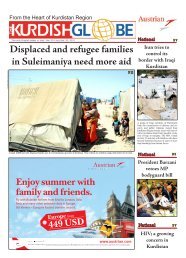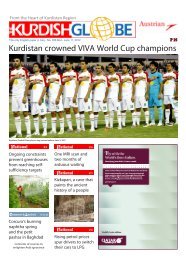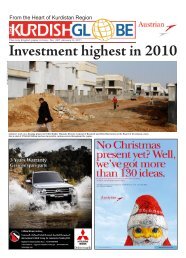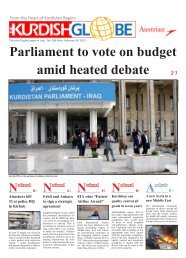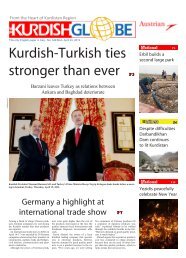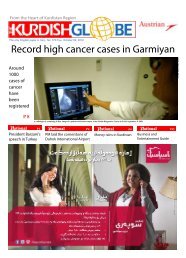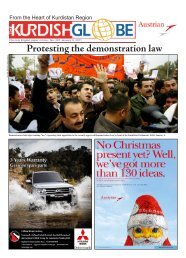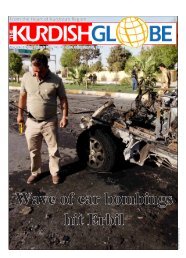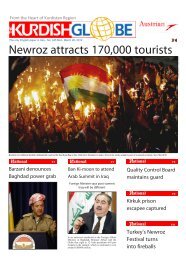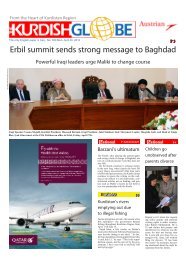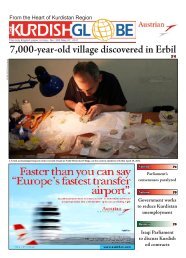KDP confirms government rotation - Kurdish Globe
KDP confirms government rotation - Kurdish Globe
KDP confirms government rotation - Kurdish Globe
Create successful ePaper yourself
Turn your PDF publications into a flip-book with our unique Google optimized e-Paper software.
The <strong>Kurdish</strong> <strong>Globe</strong> No. 335, Saturday, January 07, 2012 6<br />
Gridlock worsens in Suleimaniya<br />
No relief on the<br />
horizon as traffic<br />
on Suleimaniya’s<br />
city streets comes<br />
to a screeching<br />
halt on most days.<br />
Despite the bad conditions<br />
of Suleimaniya city streets<br />
and the fact that most of the<br />
streets in the city are very<br />
narrow, the number of vehi<br />
hicles flowing into the city<br />
is increasing rapidly on a<br />
daily basis. The result is<br />
a huge traffic problem in<br />
Suleimaniya both on the<br />
main streets and in city<br />
neighborhoods.<br />
The main rush hours in<br />
the city include 08:00 to<br />
09:00 a.m., when business<br />
starts and offices open; the<br />
two early afternoon hours<br />
are between 01:00 p.m.<br />
till 03:00 p.m. when most<br />
of the <strong>government</strong> offices<br />
close, and the early eveni<br />
ning hours before sunset<br />
when a majority of people<br />
are heading home. During<br />
these hours the city streets<br />
are almost completely<br />
blocked.<br />
Officer Bakhtiyar Mohi<br />
hammed, a traffic police<br />
officer at the Media Depi<br />
partment of Suleimaniya<br />
Traffic Police Directorate,<br />
stated in an interview with<br />
The <strong>Kurdish</strong> <strong>Globe</strong> that<br />
the traffic situation in the<br />
city is terrible and worsei<br />
ening daily. “The streets’<br />
infrastructure should be<br />
improved in parallel with<br />
the developments of the<br />
traffic sector,” Mohammi<br />
med told the <strong>Globe</strong>. “And<br />
“People’s lives and safety” threatened by lack of traffic control<br />
A traffic police officer fills out an accident form for a traffic accident in Erbil. File photo.<br />
they should meet the<br />
needs and expectations of<br />
the public.”<br />
Major traffic problems<br />
in Suleimaniya occur in<br />
areas such as Azadi Park<br />
Street, Kareza Wshk<br />
Street, Zargata Highway,<br />
some streets in Bakhtiyari<br />
Quarter and others. Acci<br />
cording to Mohammed,<br />
besides the huge traffic<br />
in these areas, in some of<br />
the intersections in those<br />
streets there are no traffi<br />
fic lights and there is lack<br />
of sufficient traffic police<br />
to control the situation,<br />
something that has “made<br />
the problem more serious<br />
and results in traffic accidi<br />
dents and threatens peopi<br />
ple’s lives and safety.”<br />
Officer Mohammed also<br />
argues that when law is in<br />
place there will be no need<br />
for traffic police to control<br />
everywhere, “for instance<br />
the right hand law should<br />
work automatically withoi<br />
out an officer enforcing<br />
it. Besides, it is impossi<br />
sible to put an officer in<br />
every intersection of the<br />
city.” Right side law frees<br />
drivers not to stop at cross<br />
roads; they just pass at the<br />
right side.<br />
Despite the fact that there<br />
are currently six overpassei<br />
es and four underpasses<br />
on the main streets in Suli<br />
leimaniya, the traffic is<br />
still a major issue in the<br />
city and on 60 Meter Ring<br />
Road, which is outside the<br />
city and is supposed to be<br />
a high speed road. Someti<br />
times traffic on this street<br />
is not much different than<br />
other streets downtown.<br />
Shamal Ali, a taxi driver,<br />
says that sometimes he<br />
decides to use 60 Meter<br />
Ring Road to escape the<br />
city center’s traffic, but he<br />
realized this is no longer a<br />
useful alternative.<br />
While overpasses and<br />
underpasses constructed<br />
in the city have helped<br />
reduce the traffic in Suleimi<br />
maniya, they have always<br />
faced problems; the Khasri<br />
raw Khal Overpass facing<br />
the Rand Gallery is curri<br />
rently under construction.<br />
Recently, the Suleimaniyi<br />
ya Municipality decided to<br />
construct more overpasses<br />
and underpasses, but acci<br />
cording to Sheikh Azad<br />
Naqshbandi, Chair of the<br />
Traffic Committee at the<br />
Suleimaniya Municipality.<br />
He said that these projects<br />
are currently on hold due<br />
to lack of sufficient funds.<br />
Figures at the Directorai<br />
ate General of Traffic<br />
Police reveal that there<br />
are currently 1.43 million<br />
vehicles in Kurdistan Regi<br />
gion, 250,000 of which<br />
are inside the center of<br />
Suleimaniya. Every day<br />
some 1,000 cars are impi<br />
ported into the region, 140<br />
of which are brought into<br />
Suleimaniya.<br />
Meanwhile, the region’s<br />
authorities have granted<br />
one million driver’s lici<br />
censes all throughout<br />
Kurdistan Region.Halkawt<br />
Abdulla, a traffic and road<br />
expert, complains about<br />
having two different systi<br />
tems for licensing in Suli<br />
leimaniya and Erbil, and<br />
he also thinks that there<br />
are many shortcomings in<br />
the system. “In my opini<br />
ion, 70% of license holdei<br />
ers know how to drive but<br />
are ignorant how to deal<br />
with other drivers, as they<br />
do not abide by the traffic<br />
laws, they drive fast and<br />
they do not respect road<br />
signs,” stated Abdulla in a<br />
<strong>Globe</strong> interview.<br />
But statistics show that<br />
the number of traffic-acci<br />
cident victims in 2011 was<br />
lower than that of 2010. In<br />
2011, a total of 758 people<br />
died and 8,817 were inji<br />
jured in traffic accidents,<br />
while in 2010 total deaths<br />
were 817 and injuries were<br />
12,000.<br />
Speaking of the negati<br />
tive aspects of traffic<br />
and increased number<br />
of vehicles in Kurdistan,<br />
Abdulla mentioned that<br />
the increased traffic and<br />
number of cars is having<br />
a serious impact on the<br />
environment.“In many<br />
countries, the exhausts<br />
of vehicles are equipped<br />
with a filter that filters the<br />
poisonous and harmful<br />
elements,” explained Abdi<br />
dulla. “However, majority<br />
of vehicles imported into<br />
Kurdistan are not equipped<br />
with this filter.”<br />
Director Nassir Hassan tells about his projects<br />
GLOBE PHOTO/ Safin Hamed<br />
GLOBE PHOTO/ Safin Hamed<br />
Nassir Hassan, <strong>Kurdish</strong> filmmaker<br />
In an interview with The<br />
<strong>Kurdish</strong> <strong>Globe</strong>, Nassir<br />
Hassan, a famous Kurdi<br />
ish filmmaker and the formi<br />
mer General Directorate<br />
of Cinema at the Ministry<br />
of Culture and Youth, disci<br />
cussed closing the directi<br />
torate in 2012 and his work<br />
in the future.<br />
<strong>Globe</strong>: What are reasons<br />
behind closing the Directi<br />
torate of Cinema?<br />
Nassir: Closing the Diri<br />
rectorate of Cinema makes<br />
me anxious because cinei<br />
ema works are still in the<br />
early stages.We have many<br />
successful productions that<br />
participated in internationai<br />
al festivals. I hope the Mini<br />
istry will have a successful<br />
plan for cinema production<br />
and moviemakers.<br />
<strong>Globe</strong>: Why has this diri<br />
rectorate lasted only two<br />
years? Was it careless in its<br />
duties or were there other<br />
reasons?<br />
Nassir: I think we did<br />
our best. There are many<br />
finished works to be menti<br />
tioned; for instance, we<br />
produced 75 short films<br />
and 15 feature films. And<br />
we conducted many film<br />
festivals all over Kurdistan<br />
cities.<br />
<strong>Globe</strong>: Why is there nopi<br />
proper cinema hall in Erbi<br />
bil? Did you request the<br />
<strong>government</strong> to build a new<br />
hall?<br />
Nassir: Actually we suggi<br />
gested building a cinema<br />
hall two year ago, and then<br />
the KRG contacted compi<br />
panies. But still, there is no<br />
hall in Erbil.<br />
<strong>Globe</strong>: Are you going<br />
to take any position after<br />
closing this directorate?<br />
Nassir: From now on, I<br />
will dedicate my time with<br />
art and never take any admi<br />
ministrative position.<br />
<strong>Globe</strong>: What art? What is<br />
your new production?<br />
Nassir: I am preparing to<br />
direct Kirkuk 4,The Biogri<br />
raphy of Ali Mardan and<br />
Abdul-Kareem Qasim’s<br />
Biography.<br />
<strong>Globe</strong>:You mentioned<br />
the drama Kirkuk 4, when<br />
will it be finished and<br />
screened?<br />
Nassir: The drama Kirkuk<br />
4 consists of four parts<br />
within 30 series. It talks<br />
about the history of Kirkuk<br />
from 1979 to 2003, showi<br />
ing all political and social<br />
changes in the city. I have<br />
finished the artwork of the<br />
first part. If the first part is<br />
successful, I will continue<br />
the rest. The Ministry deci<br />
cides on which channel to<br />
broadcast the film.<br />
<strong>Globe</strong>: In your other artwi<br />
works you referred to Abdi<br />
dul-Kareem Qasim’s Biogri<br />
raphy; what it is about?<br />
Nassir: This drama is<br />
about Abdul-Kareem Qasi<br />
sim’s life and his political<br />
work. And also it has some<br />
scenes of Erbil, Suleimaniyi<br />
ya and Kirkuk. Arabic is<br />
the language of the movie.<br />
<strong>Globe</strong>: A cinema festival<br />
under the name of Stop<br />
Violence Against Females<br />
was held in Erbil. After it<br />
was over, some said sevei<br />
eral of the films might win<br />
awards, but they didn’t.<br />
What is your precise commi<br />
ment?<br />
Nassir: This festival was<br />
like a workshop. The aim of<br />
this festival was to convey<br />
messages through the presi<br />
sented films. Awards were<br />
not a measurement for the<br />
success of the works. The<br />
contributors need to think<br />
of improving their future<br />
works instead of busying<br />
themselves with winning<br />
awards.



